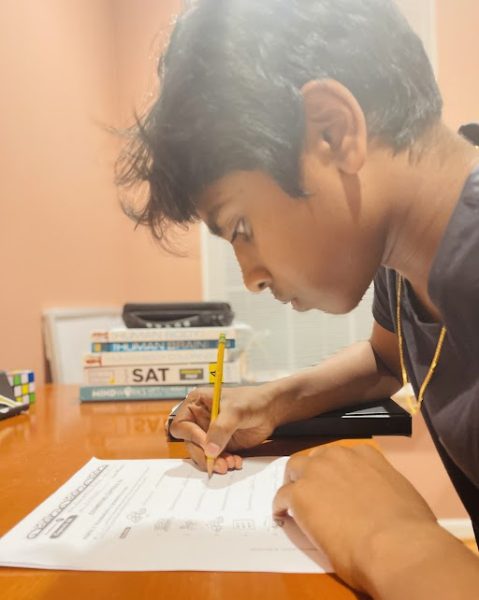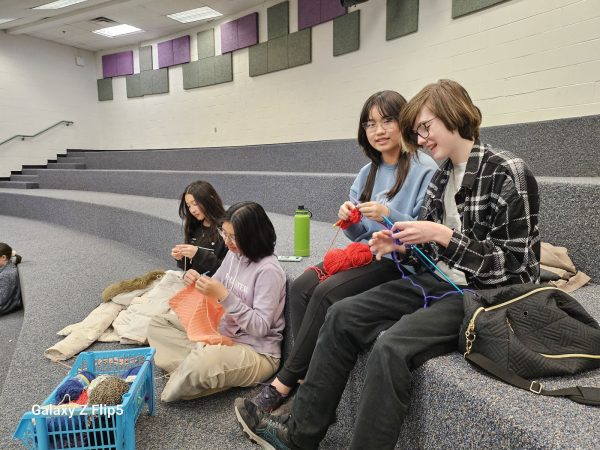Students write for a national change in civics education
Taher Nalwala, an eighth-grader on the Discovery team, fills out an envelope for his Civics LAA letter to be sent to his chosen government official.
Have you ever felt the need to make a change in your community, or even society as a whole?
Eighth-grade students at RCMS did just that, by embarking on a unique assignment for their civics classes this year to write a letter to a current government official in order to persuade them to nationally incorporate more civics education in schools.
This assignment, called the LAA (Local Alternative Assessment), was adopted in place of SOL tests for specific subjects, including eighth-grade Civics and Economics, to support balanced assessment practices as part of the Virginia Assessment Program. The focus on shifting toward this project style assessment was fueled by a focus on culturally responsive, student-centered learning by providing creative methods and giving voice to students.
“The purpose of the school level is for the Civics team to agree upon a way that all of the students in eighth grade can demonstrate that they have acquired civics education and can communicate some of the reasons that they are getting it,” said Mr. William Darr, a civics teacher on the Discovery team.
Although not all classes are completing the LAA at the same time, it is the same structure and assignment type for all teams. The process consists of learning more about the topic—civics education—and using this to write a letter to a government official of choice.
“The process of writing the LAA begins with learning research skills, or reinforcing learning research skills. The second part of it is planning out and organizing the information that you compiled, and that last part is really just drafting a final draft,” Mr. Darr said. “We wanted to make sure that you had a realistic idea of what it is like to put out a long-range writing assignment.”
As this assignment has replaced the SOL, there has been some reflection on how the LAA has been compared to the SOL, most of which is very positive. Olivia Parker, an eighth-grader on the Discovery team, explains how she believes the LAA is more beneficial for the class.
“I think it [the LAA] definitely makes you think; we learn more about civics than if we were just doing a test because tests a lot of time are just memorizing words and subjects, whereas in the LAA we actually have to create an opinion and do research,” Olivia said.
Students who are better at taking tests might believe that the SOL is more conducive to them.
“I personally am a good test taker, so I would feel a lot more comfortable taking a test about facts than having to explain to someone in latent terms how the government works,” said Zoeb Izzi, eighth-grader on the Explorers team. “So to me, it’s a lot easier to take a test, click an answer, and remember the facts.”
Some difficulties while completing the LAA have been described by students themselves.
“The LAA was long and required a lot of research, so maybe making it more streamlined and having the deadlines more spread out since there was a lot of stuff that had to get done in a short amount of time would help,” Olivia said.
Zoeb also believes that the LAA could pose some challenges for students.
Because the LAA is an essay, and it’s not an SOL or a test, which is what most of us are used to for these kinds of subjects, it’s a lot more difficult for students to wrap their heads around the fact that you don’t have to know everything or say every single thing to these people,” Zoeb said. “You have to consider it from their point of view.”
Despite these drawbacks noticed by students, many also believe that this assignment can be very beneficial for them.
“I think the LAA really improves your research skills and teaches how to achieve something practical, which is to advocate through rights,” said Kabeer Parmar, an eighth-grade student on the Explorers team. “It also really increases your knowledge about the common misconceptions about the government, such as QAnon and other conspiracy theories.”
Benefits related to democracy have also been noted by Mr. Jerome Stack, a civics teacher on the Voyagers team.
“The LAA is essential and critical because it helps students understand that that’s their voice in government because we have a republic, we have representative democracy, and that’s their voice in a government that is supposedly by the people,” Mr. Stack said.
Students also chose a government official to send their letters to, and Mr. Darr believes this was an important part of the LAA.
“I think that it [writing to government officials] is something that can help students understand that even though they might be voting age, and they might not even be citizens, that they can still have voices,” Mr. Darr said. “When it comes to having a sense that you even play a role in the political system at all, this is something that might offer that to a student.”
Students also think writing the LAA could also impact students in the future as a citizen.
“I think I can definitely use some of the information to advocate for civics education,” Olivia said. “I have also gained knowledge on research skills and how I would be able to write more essays or create more opinions in the future about government and education topics.”
Overall, students and staff are pleased with the idea of the Civics LAA after finishing it.
“The LAA is really important to school, not just because of civics education, it is more about the concept of the LAA,” said Tanish. “That concept is so important to everything in school and building a whole community.”
Arjun Garg is an eighth-grader on the Discovery team. In his free time, he enjoys cooking and reading.










